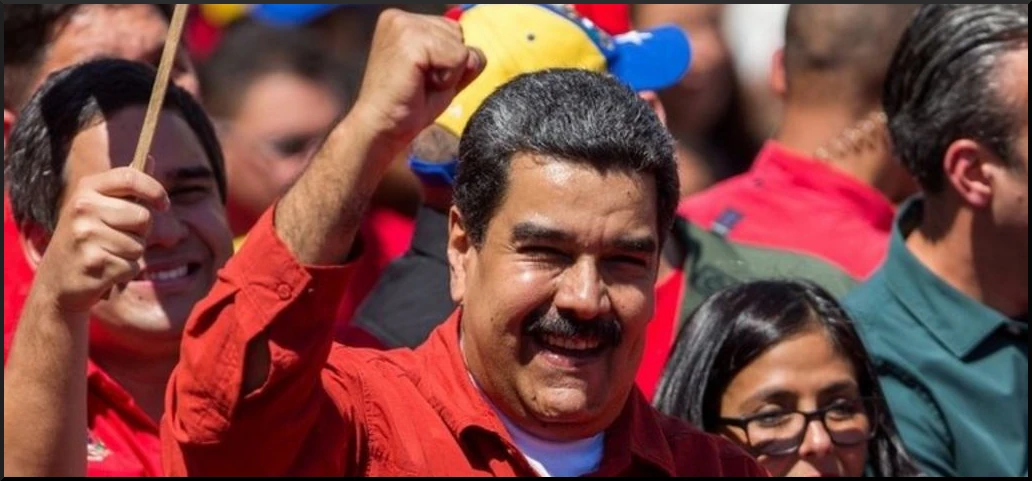by Sara Flounders, published on Workers World, July 22, 2024
Flounders, a coordinator of the SanctionsKill Campaign, will moderate the July 23 webinar described at the end of this article.
The upcoming elections in Venezuela, scheduled for July 28, are in the crosshairs of another attempted U.S.-orchestrated regime change operation. U.S. politicians have already intentionally created years of economic hardship by freezing assets and blocking essential imports of medicines and basic infrastructure. Imposing extreme economic sanctions is their weapon of choice.
Sanctions are, by design, U.S. imperialism’s most ignored weapons. They are silent, exert unrelenting pressure and kill millions of people.
In preparation for the latest round of voting, the U.S. media has once again declared, even before the vote takes place, that the elections are rigged. Their well-funded opposition slates, which have the lowest level of popularity, are declared in advance to be the only acceptable choices. U.S. agencies funneled millions of dollars to fund and create opposition media and political parties.
U.S. corporate power is up against the overwhelming popularity of twice-elected President Nicolás Maduro’s government and an intense grassroots mobilization of the whole population to survive under harsh war conditions and to actually thrive in difficult conditions of scarcity.
The U.S. use of sanctions — economic coercive measures — is an especially deadly and yet little understood weapon. It is used in attempts to overthrow and strangle popularly elected governments that attempt to defend their national sovereignty. It is a brutal weapon that impacts the whole population, but it is especially cruel in the toll on the most vulnerable people in every society. Hyper-inflation intentionally impacts the poorest, those without any savings or extra resources.
Accomplishments of revolutionary Venezuela
The extreme hardships imposed on oil and resource-rich Venezuela are brutal examples of the U.S. sanctions weapon. Under the Hugo Chavez government, the Venezuelan government was able to use the oil and gas resources to rapidly build schools, hospitals, thousands of corner health clinics, along with electricity, sewers and potable water lines into the poorest barrios. Millions of low-cost housing units were under construction across the country.
During these years, the revolutionary government of Hugo Chavez, who was in office from 1998 until his early death in 2013, there were enormous life-changing, structural changes in Venezuela. These changes threatened the profits of the largest U.S. oil, gas and banking corporations.
The U.S. imposed sanctions against Venezuela started in 2005. Beginning in 2014, Washington accelerated sanctions against Venezuela in a concerted effort to undermine the elected government of President Maduro and distort the electoral outcomes.
By 2018, sanctions reached a whole new level and systematically blocked basic medicines for immunization shots, diabetes, heart disease, cancers and nutritional supplements. Spare parts for equipment, even for water and electricity couldn’t be bought on the international market. Venezuela was blocked from selling its oil and gas on international markets. Billions of dollars of its foreign assets were seized.
Against every sanctioned country the U.S. government demands that every other country go along with sanctions legislation passed in Washington, D.C., or face fines and seizures of their funds. Suddenly the cost of food and essential medicines becomes an enormous obstacle.
U.S. sanctions use the same template
The charges raised against every one of the more than 40 countries sanctioned by the U.S. government are usually the same template. Venezuela is no exception.
The targeted government in countries facing U.S. sanctions attack is first declared guilty by U.S. corporate media, and the whole U.S. political establishment joins in demonizing the leadership as guilty of criminal, anti-democratic or corrupt actions. The claim, endlessly repeated, is that imposed sanctions are only targeting criminal individuals and enterprises. But this is a total fraud. The blockade is designed to throw the entire economy into shock.
The media line repeats endlessly that the economic dislocation, wild inflation, shortages of essential products are caused by leaders who are corrupt, inept and paid-off. Slanderous terms declaring elected leaders to be autocrats, dictators, are used repeatedly in each news article.
It takes intense new levels of mobilization of the entire people to resist an orchestrated U.S. take-down or regime change operation. It takes even more to build a force capable of mobilizing the population in the midst of scarcity. The need is to both survive and to thrive.
This is the challenge that Venezuela has undertaken with great determination and revolutionary fervor.
Webinar discussion of sanctions and July election
On Tuesday, July 23, the SanctionsKill Campaign and the Venezuela Solidarity Network are sponsoring a webinar, which is hosted by United National Antiwar Coalition, to help expose the role of U.S. sanctions in the July 28 elections. The creative tactics used by the mass movement in defending itself against the full weight of the U.S. government and its funded opposition is the focus of the speakers. The webinar, titled “Venezuela — A High Stakes Election Threatened by U.S. Sanctions,” will discuss this in depth.
The speakers are Maria Paez Victor, Ph.D., a Canadian-Venezuelan sociologist, academic and activist and Joe Emersberger, co-author of “Extraordinary Threat: The U.S. Empire, the Media and Twenty Years of Coup Attempts in Venezuela.”
Watch the Webinar here:
*Featured Image: Nicolás Maduro, current President of Venezuela. src: BBC
Sara Flounders is an American political writer who has been active in ‘progressive’ and anti-war organizing since the 1960s. Sara is Co-Director of the International Action Center (IAC) and a member of the Secretariat of Workers World Party She also frequently writes for Workers World newspaper and publishes articles on the International Action Center website.
